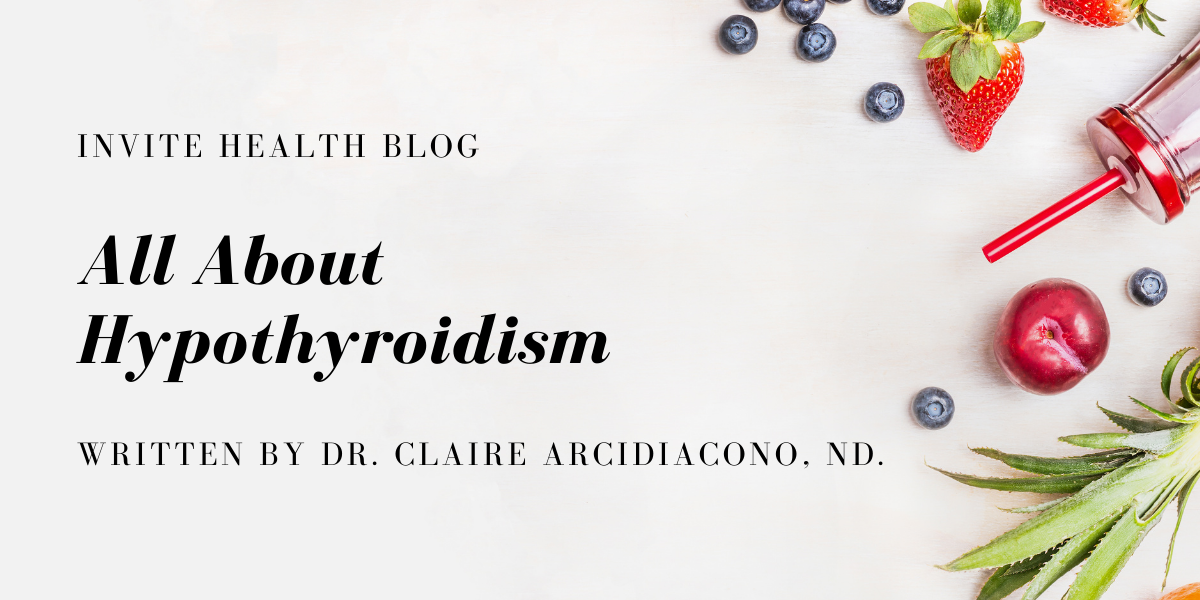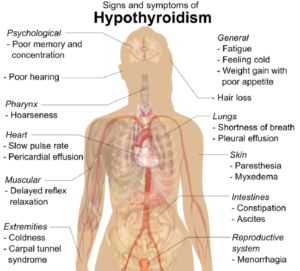All About Hypothyroidism

hypothyroidism
Written by Dr. Claire Arcidiacono, ND
For further questions or concerns email me at carcidiacono@invitehealth.com
The thyroid can experience multiple dysfunctions. Here’s what you need to know about hypothyroidism.
What Is Hypothyroidism?
Hypothyroidism is where the body doesn’t produce enough thyroid hormone. This can happen if there is a problem in the thyroid itself or if there is a problem in the anterior pituitary which is the organ that basically controls the thyroid. For this lecture we will focus on the thyroid itself.†
In typical hypothyroidism blood tests will show higher than usual TSH and lower than usual T4 & T3. For a more in-depth explanation, feel free to see last week’s blog on thyroid testing.†
ALL ABOUT THYROID TESTS. Read Now>>
Normal TSH is .5 to 5mu/l and normal T3 is 80-220mg/dl. T4 is 5-12ug/dl. However, this is where it gets interesting because “normal” doesn’t mean optimum. The optimum range for TSH is 1.3-2.5mu/l. For example, a value of 3 indicates what is known in the holistic community as “sub-clinical hypothyroidism” and is very often accompanied by symptoms of low thyroid. While sub-clinical hypothyroidism isn’t usually severe enough to warrant conventional treatment, certain supplements have been found in studies to alleviate symptoms.† (1)
What, exactly, are the most common symptoms of a low thyroid? To start, you may experience difficulty concentrating as well as fatigue. There is also a feeling of being cold as well as slow heart rate which is often associated with shortness of breath. Weight gain is often associated with low thyroid. Hair loss is another symptom that often has people coming in to see a nutritionist. Just a heads up: if you are having hair loss, getting your thyroid tested is a great first step to finding out what is going on. Less commonly known as a symptom is depression. In women, menstrual cycles can often be heavier than usual (although as the hypothyroidism persists, it can progress to lighter than usual cycles). Since hypothyroidism is associated with a slowing down of things, it makes sense that there is delayed tendon reflexes. That is where the doctor hits your knee and you get to kick him. Constipation as well as changes in digestive health are also noted. I’ve included a picture for a system by stem breakdown of all the symptoms of hypothyroidism since the thyroid affects almost every system.† (2)

Now what can potentially lead to the symptoms of hypothyroidism? In many cases too little iodine is a trigger. Also treatment with radioactive iodine can affect the thyroid. Injury to the hypothalamus or anterior pituitary can also lower the amount of thyroid hormone produced. Obviously, being born without a thyroid or having thyroid surgery can cause the thyroid hormone to be low. Even certain prescription medications can cause low thyroid as a side affect.†
Autoimmune such as Hashimotos Hypothyroidism, Postpartum Hypothyroidism as well as Myasthenia Gravis can cause the symptoms of hypothyroidism. But since this is such a large topic, I’ll talk about this later on.†
Last but not least, any autoimmune disorders such as celiac disease, Rheumatoid arthritis, SLE, and even diabetes can affect the thyroid. From a more holistic point of view, “leaky gut” can also affect the thyroid. Which is why so many holistic practitioners say treat the gut!† (3)
How to help your thyroid
Working with hypothyroidism is one of those things that requires a gentle touch, if you will. Many of the studies find herbs and supplements to help moderate thyroid symptoms, but they are very strong. I advise working with a qualified nutritionist from InViteⓇ Health.†
- Bladderwrack or kelp: Studies have shown that this helps with providing iodine to help in the case of iodine deficiency which is very common in hypothyroidism. In fact, studies have shown the iodine in kelp to be much easier for the body to use than just taking iodine by itself!† (4)
See InViteⓇ Health Thyroid HxⓇ to find this amazing source of iodine!†
- Ashwagandha: Studies once again show that this amazing herb is helpful for the thyroid. Studies have shown that Ashwagandha helps subclinical hypothyroidism in just over 8 weeks! Other studies show an increase in T4 from the baseline.† (5)
See InViteⓇ Health Thyroid HxⓇ to find this amazing plant!†
3.Coleus forskohlii has been found in studies to work to increase synthesis of T4 by the thyroid. In one animal study, levels of TSH went down, while the levels of T3/T4 went up.† (6)
See InViteⓇ Health Thyroid HxⓇ to find this amazing plant!†
- Black Cumin seed or Black Seed has been found in studies to have a protective role in hypothyroidism. In 1 study black cumin raised T3.† (7)
See InViteⓇ Health Black Seed with Rosemary and Cordyceps as well as our InViteⓇ Multi for Men!†
- L-tyrosine, zinc, and selenium are all important nutrients for producing thyroid hormones.† (8)
See InViteⓇ Health Thyroid HxⓇ, Zinc tablets/lozenges, Immunity HxⓇ, as well as all our wonderful InViteⓇ multivitamins!†
- Glandular type supplements are also an option for thyroid disorders and are available at select InViteⓇ stores! For more information call 212-249 -2036.† (9)
These are very basic ideas for hypothyroidism. But this is a very complex issue. Working on diet, stress and even gut health are all important aspects of helping our thyroid. This is why it is so important to get the blood work and a list of medications you take for any reason and visit a store such as our 71 Street store. This ensures the best protocol for you.†
BEING MINDFUL ABOUT STRESS – INVITE HEALTH PODCAST, EPISODE 474. Listen Now>>
Next week, hyperthyroidism!
(1) https://www.uclahealth.org/endocrine-center/normal-thyroid-hormone-levels
(2) Longo DL, Fauci AS, Kasper DL, Hauser SL, Jameson JL, Loscalzo J (2011). “341: disorders of the thyroid gland”. Harrison’s principles of internal medicine (18th ed.). New York: McGraw-Hill. ISBN 978-0071748896.
(3)[8] Garber JR, Cobin RH, Gharib H, Hennessey JV, Klein I, Mechanick JI, Pessah-Pollack R, Singer PA, Woeber KA (December 2012). “Clinical practice guidelines for hypothyroidism in adults: cosponsored by the American Association of Clinical Endocrinologists and the American Thyroid Association”. Thyroid. 22 (12): 1200–35. doi:10.1089/thy.2012.0205. PMID 22954017.
(4)Catarino, M. D., Silva, A., & Cardoso, S. M. (2018). Phycochemical Constituents and Biological Activities of Fucus spp. Marine drugs, 16(8), 249. https://doi.org/10.3390/md16080249
(5)Sharma, A. et al. (2018). Efficacy and Safety of Ashwagandha Root Extract in Subclinical Hypothyroid Patients: A Double-Blind, Randomized Placebo-Controlled Trial. Journal of alternative and complementary medicine (New York, N.Y.), 24(3), 243–248.
(6)Hameed, S. I., Al-Shahwany, A. W., & Salih, S. J. (2020). Evaluation of the Activity of Some Plants Extracts on Thyroid Gland Regulation in Female Albino Rats. Iraqi Journal of Science, 254-265.
(7)Ismail, M. et al. Effect of Nigella sativa L. on serum concentration of thyroid hormone, thyroid stimulating hormone and glucose in alloxan-induced diabetic rabbits. Ir Vet J. 2003;59(9):462–4.
(8)https://pubmed.ncbi.nlm.nih.gov/19594417/
(9) https://www.naturalmedicinejournal.com/journal/2014-08/thyroxine-and-triiodothyronine-commercially-available-thyroid-supplements

